- Home
- Nancy Means Wright
Mad Season Page 5
Mad Season Read online
Page 5
He almost wished it, he’d be out of here, away from these torturers.
Suddenly Gerry Dufours gave a blood-curdling yell and broke through the chain of hands and started running, yelling like an Indian, and they let him go. “Next time,” they shouted after him, and now there were four to one, and Vic knew he’d never get away.
He wanted to be dead, he dropped to the ground, pulled his legs up under him. But they yanked him up, ripped off his backpack. He was more angry than afraid now, he grabbed for it—it held his telescope. The big one had it in his hand. “Yo, a farmer with a telescope,” he said, and danced around, peering through it.
“You be careful of that!” Vic screamed, “you break that and I’ll—”
The big one gave a high-pitched giggle. “You’ll what, string bean?” Vic gave up, he didn’t know what, there was no ‘what.’ There was a pile of hay now, at the foot of a tree, they were pushing him into it, were tying his legs, his chest, to the tree trunk. They were going to burn him alive! He resigned himself to it. He’d be dead, and no one would know who did it. Mr. Hanna and his mother would never find out.
Or would they? There was Gerry, Gerry got away. There was that hope.
“Dufours will tell on you,” he screamed, and a boxing glove hit him on the nose. “He knows who you are. You better not kill me!”
It worked, they were quiet a minute. Then one of the smaller ones said, “Who’s killing you? Nobody’s killing you. We’re just gonna tie you up in this hay, that’s all. ‘Cause that’s where you belong, dummy. Dummy in a haystack.” And they all laughed and seemed more relaxed again. Then one of them took muddy cow patties out of his sack and smeared them on Vic till he was practically covered and shoved one in his mouth till he gagged. They danced around him again, till they heard Gerry Dufours’s voice, and another louder, angry one, Gerry’s dad’s, and they ran away, back through the woods.
Mr. Dufours untied him, cursing the whole time, and then Gerry cleaned the dung off him. Vic groped around for his telescope but couldn’t find it. He couldn’t see, the tears were streaming out of his eyes. He was sorry about that, but he couldn’t stop, he was so pissed about his telescope. It took three years to build it, and all his allowances for the parts. He beat his fists into the tree till Gerry’s pa pulled him away and said, “No good doin’ that. What’s gone’s gone.”
“Maybe you’ll find it, maybe they dropped it,” Gerry said, but Vic knew they didn’t. They might break it, but they wouldn’t drop it for him to find.
The Dufourses’ house was pretty shacky inside, more so than the Larocques’: beat-up linoleum, saggy wicker chairs with blankets thrown over the backs, plastic crucifixes on the walls (Aunt Bertha would rip them down). He washed up in an iron sink full of rust. His own house, it had nice stuff in it, there were books on the shelves. He didn’t see a single book here except on Gerry’s back. He wanted Unsworth and the rest to see his house. They’d see he was different from Gerry, they couldn’t lump him and Gerry together like this.
One of them was Unsworth after all, one of the ones with the boxing gloves, he was sure of it. Something about the voice, the laugh, the smell—that hair stuff he got from his brother (how did Emily stand it?). He smelled it when they put the dung in his mouth, didn’t he? He had a good sense of smell, Vic did, they couldn’t put much over on him.
No, they couldn’t. They wouldn’t, jeezum, it wasn’t fair. He scrubbed his face and neck till they hurt. Mrs. Dufours came out with a towel. She rubbed his back, and he slumped forward and let her. She was a nice lady. She didn’t smell, either.
* * * *
The girl was relaxed, Colm saw, propping the cows—they’d have to talk while she worked. She waved to him, pulled a child’s wagon to the center aisle at the north side of the barn, and wet a paper towel with something smelly—she was disinfecting the cows’ teats, he supposed you had to do that. Her brother had missed the school bus. That would delay Colm, he wanted to hit the Alibi before dinner, check Willy’s excuse.
She was a pretty girl, like her mother, but less intense, more fragmented somehow. Case of adolescence, he supposed, kids that age were so scattered, like kaleidoscopes: flashing green one second, red the next—you never knew where they were coming from. Of course he’d never had any of his own, what did he know?
He looked at Emily with new interest. She might have been his daughter. Weird to think about.
She was gazing up at him now, waiting for the question. He asked if she’d seen anyone around the house that night. She was out with Wilder Unsworth, Ruth had told him that. What time did they get back?
“Eleven-thirty,” she said. “My curfew’s eleven on school nights and I was late. We went to a movie, and then ... we sat in the car a while.” She threw the towel into the gutter behind the cow, then forced a stream of milk from each teat.
“You didn’t see any, any activity, over at the Larocques’?”
“No, but we weren’t exactly looking.” She had the grace to blush, and he smiled. He remembered how it was with Ruth. A bomb could have exploded and he’d have gone on kissing her, he’d go home with a case of blue balls. His glasses slipped down his sweaty nose, and he shoved them back up. The place reeked of cowshit. He supposed you got used to it. He didn’t want to look down at his shoes.
“Then Wilder returned to his car. And drove right off?”
She peered down at her fingernails, sucked in her lips. He repeated the question.
“Not exactly at once.” She looked at him and then over at the window. “I saw him out my window. He was still in the car, he was watching the moon.” She had a clear, high-pitched voice. Naive sounding, like Ruth.
“He didn’t get out of the car, though, and you saw him drive away.”
She fidgeted with a ring on her index finger. It looked expensive, more expensive than a farm girl would wear. He saw the swallow in her throat where it wouldn’t go down. He leaned back on his heels, gave her time to answer. She knew the implication for her boyfriend. He wondered if she’d lie for him.
“Mother called me then, and I went out in the hall to answer. When I got back to the window he was gone. I’m sure he didn’t get out. And he didn’t go to Larocque’s. Wilder’s a good person, he wouldn’t do that!”
Her face was scarlet, he had to be careful, he’d turn into the enemy. She moved on with her wagon to the next cow.
“I just needed to ask, that’s all,” he said. “It’s possible he saw someone. Did he say anything the next day at school? About seeing anything unusual at the Larocque house?”
“No.” She shut her lips tightly. She was looking paranoid now, she disinfected the cow’s flank instead of the teat. A cluster fly circled her head, and she swatted at it, impatient.
“He was in school,” he said and held his breath. It was just a hunch.
The eyes flew open. She was indignant. “He was sick. He was in bed. He was coming down with something the night before, he had a sore throat.” She coughed, like she’d caught it. Then blushed, and he felt she was making up the sore throat. “His mother signed a note. She wouldn’t sign a note if he wasn’t really sick.”
She squeezed a teat and the milk sprayed out, hit him in the glasses. “Sorry,” she said. “Is there anything else?” There was a commotion at the other end of the barn, and he heard a female voice, a baby whimper.
He wiped his glasses, but everything was milk. He tried to keep smiling. “Not unless you remember something you want to tell us. Your mother and I want to find the assailants. It was a cruel thing to do. Belle’s still in a coma.”
He didn’t usually play on people’s emotions—he tried not to, in the mortuary—but sometimes one had to. This time it worked, tears stood out in her eyes.
He peered at her through the milky lenses. “We may have to ask Wilder a few questions. Just in case, you know. Sometimes people see things and don’t realize what they’ve seen.”
The sweat sprang out on his forehead and his glasses slipped.
He could see better without them, actually. He disliked emotional encounters—maybe that was why he hadn’t fought harder for Ruth. He wished it were Vic coming into the barn. But it was the older daughter, Sharon. She shouldered her way in, a pretty young woman with long reddish hair that needed trimming, a confident smile on her round dimpled face, the baby in a sack on her chest. Here, he sensed, was the boss of the family. In her own place too, he imagined, the husband away in Alaska doing something about the environment.
“I hope you told him everything,” she told her sister. “No detail is unimportant. Did you tell about Wilder missing school the next day?”
“Yes I did, and none of your business, Sharon. He was sick, I said!” Emily cried, and turned to the next cow. Sibling strife. This he hadn’t missed, Colm thought.
Sharon laughed. “She’s so sensitive,” she said of Emily. “She takes everything the wrong way. Now, what do you want to ask me?” She swung the baby off her chest and sat on a turned-over pail. When the child whimpered she opened her blouse like it was the most natural thing in the world.
And it was, perfectly natural. It was he who was outside the norm, an anomaly, could live only other people’s lives, like an actor. He looked away while she nursed the child. It sounded like it was slurping peppermint tea.
There was nothing Sharon wouldn’t tell him, but there was nothing she could tell. Except her opinions on the family. Her mother: a wonderful woman but overworked, paranoid since her father left, and overly protective of Vic. Sharon had told her mother over and over she should sell the farm like her father wanted. Her father: a well-meaning man but afraid of intimacy, a fish thrown up on land. “Mother never understood that.”
“Your father has a sister,” he said.
“Oh,” Sharon waved her away. “Nobody pays any attention to her. Aunt Bertha’s a freak, a fundie. Got Jesus, you know. I just laugh when she tries to convert me—so does Dad.” The cluster fly landed on her arm and she knocked it to the floor, imprisoned it under a pail. Colm could hear it buzzing.
She went on. Her sister Emily: flighty, going around with blinders on, didn’t help enough around the house (Sharon couldn’t, after all, she had the baby). “If I so much as speak to her, she jumps on me, she’s so supersensitive!”
Wilder: she didn’t really know him. She didn’t want to jump to conclusions. She hoped the police would question him—Colm and her mother were just people, it was laughable. Risky too, wasn’t it? their getting involved in this thing? It was funny that Wilder missed school the next day, wasn’t it? You never knew, that was all. Sharon read a little detective fiction. She read Jane Langton, Ann Granger, she watched Mystery Thursday nights. You’re guilty until proved innocent.
She turned her wide green eyes on him for approval. “You have to turn over every stone. Like on a farm.”
He said he and her mother intended to, and thanked her, waved to Emily, went out to his car. He realized he hadn’t commented on her baby, how cute it was or whatever you were supposed to say, and then took a sharp breath. He was a man, wasn’t he? Sexist thought, he admonished himself in the next breath. Maybe that was why he was in real estate. Realtors dealt with facts: basements, septic systems. They stayed away from the psychological.
Though facts lied, too. He’d think more about that tonight, at home in bed. He hoped his father wouldn’t need him to lay out a corpse.
Was it his imagination, or had the world taken on the odor of feces?
He was driving out, turning onto the main road, when a battered green pickup with a shovel and broom sticking up out of the rear rattled into view. A man in overalls and red cap was driving it, a boy in the passenger seat. Colm held up two fingers in greeting. The man returned it, the boy peered out glumly, his face a pale round moon. It might be Vic—he hadn’t seen the boy in a year, maybe two.
Should he turn back? He’d done enough questioning for today, hadn’t he? Already he wasn’t sure if this detective business was for him. He should let Sharon take over in his place.
* * * *
Ruth hummed as she prepared to grain the cows. She hit a switch, and the feed poured down a pipe from the grain silo outside. She was using a new mix now, had everything from vitamins to sodium bicarbonate and cane molasses. She scooped the grain onto the floor ahead, to keep them from attacking the wheelbarrow with their huge pink tongues. She’d named half of them after famous females, real or fictional. Here was Florence Nightingale: Florence had her third calf three weeks ago. Here was Catherine Earnshaw, the independent. She’d been bred for the first time—what kind of mother would she make? Even now she was butting the stanchion bars with her head. And Charlotte Bronte, at the end of her fertile years, who only last week had dropped a sickly calf—maybe her last, who knew? They were all strong-minded in their own way; none of them would stand for this BST business: being pumped full of growth hormones, turned into objects that poured out the milk—up to 25 percent more, they claimed. And for what? To add to the surplus?
It was harmless, the FDA said. Sure, harmless as synthetic hormones, chemical additives, pesticides. Harmless as arsenic.
But she was getting stirred up again, just when she’d started to relax. It was worrisome enough having Vic miss the bus, Colm question her family—though she was glad to have his help in this, she was too busy to find out everything herself. And what had the police done? A dozen break-ins this past spring, and none of them solved. Not to mention the Charlebois fire. Who would have done something like that? Her neck got hot, imagining her own place on fire. It was unthinkable, that.
Three more and she was done. Emily had prepped the cows; Tim would come in to do the milking. She wasn’t crazy about machine milking: she tended to overmilk, never got the thing off at the right moment. Maybe a dozen cows was enough, milk them by hand. But there was no money in that, she had to think of money.
She glanced at her watch: 5:36. Vic should be home, even if he missed the bus. He’d call if he needed a ride. Through the stall window she saw Sharon coming toward the barn. “He was nice,” Sharon said as she entered. “He was nosy. He’s not bad looking. How come you didn’t marry him?”
“Who’s nosy now?” Ruth said. “Vic call?”
“Honestly, Mother, you’ve got to stop worrying about that kid. If he needed a ride he’d call.”
“It’s after five, he has house chores. I traded him the barn for the house because . . .” She paused, but it was too late.
“So he won’t smell like a barn,” her daughter said. “Well he lives on a farm, he’s a farmer’s kid. What’s he supposed to smell like, yogurt and honey?”
“Okay, let’s leave it. No other calls—from Marie Larocque? She promised to call if there was any change in Belle. Though she’s not exactly reliable. She gets scattered.”
Sharon put an arm around her mother’s neck. “It’s all right, Mother, it’ll be all right, stop worrying.” The baby whimpered on her back.
Charlotte gave a long low bellow, answered by her frail calf. Outside there was the hollow metallic sound of a truck door slamming. And then Emily’s voice calling, “Mother, telephone! It’s Marie. Better hurry up. She’s in hysterics.”
* * * *
Why did he turn back? Colm didn’t know, but he had this feeling—he was the paranoid one now. It was Vic all right, Colm saw the boy run up to the house and then Ruth dash out of the barn in a baggy blue sweatshirt. Sharon ran behind, baby bouncing on her back. Emily came out on the house porch, waving her arms, looking excited. The farmhouse door banged twice, the baby wailed.
He drove into the driveway—what the hell, they’d have seen him anyway. Of course he didn’t want to get into a family quarrel, it could be something about Pete. He’d go in on the pretense of making a time to see Vic, for tomorrow; he’d get here early, before the boy left for school. For some reason it seemed important to talk to the boy. And Ruth couldn’t do it, not with objectivity. Sharon was probably right, she overprotected the kid.
No one answ
ered when he knocked on the back door, so he just walked in. They were all there, sitting around the kitchen table, looking up at their mother. They hardly noticed him. She was holding the phone in her hand, it was still buzzing.
“That was Marie. Belle’s dead,” Ruth said to the vase of grasses and pussy willow on the table. “She’s gone. An hour ago. They murdered her. Whoever it was, it was murder.”
Chapter Five
Marie insisted on laying Belle out, she wasn’t to be embalmed, Belle “wouldn’t like that.” She didn’t want Belle cremated, and she refused an autopsy. So the coroner had backed off: he’d known Belle personally, wanted Marie’s vote, an election coming up. Anyway, the coroner admitted, even an autopsy couldn’t prove exactly how a wound had been inflicted.
They had to have the funeral the next day, then, Colm’s father said, looking doubtful, stroking back his several white hairs—”I mean, with no embalming?” and Marie agreed. Already there was that waxy look, the corneas cloudy, the body frozen, face and neck going greenish red; in thirty hours the rot would set in. Colm was relieved about the embalming, to tell the truth. He didn’t think he could do that, not on Belle. Pumping in that stuff, like needling in crack or something.
Marie insisted on thick makeup: she’d do it herself to hide the bruises, though nothing could hide the distortion on Belle’s forehead where the blow had landed. There were still tiny red marks— Colm couldn’t think what put them there: precise as ellipsis points in a print machine or the prongs in a pitchfork, but too close together for that. His father photographed her, though; it seemed gross, but you never knew.
Marie wanted the oak coffin, the copper lining—the most expensive at fifteen hundred dollars. When Colm suggested the pine—his dad out of the room to take a leak, he did it every hour these days—she zipped up her lips like a small purse.

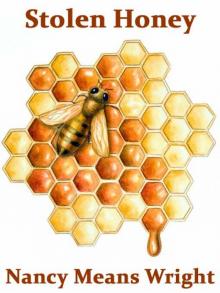 Stolen Honey
Stolen Honey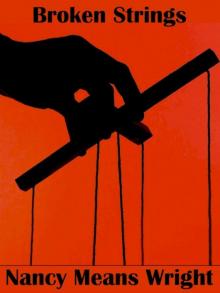 Broken Strings
Broken Strings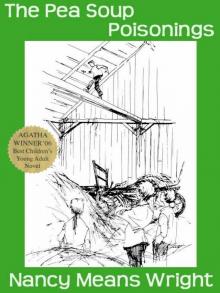 The Pea Soup Poisonings
The Pea Soup Poisonings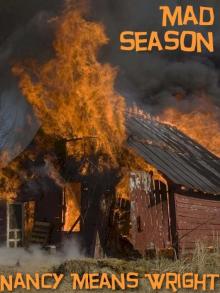 Mad Season
Mad Season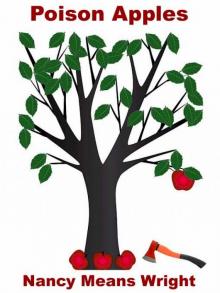 Poison Apples
Poison Apples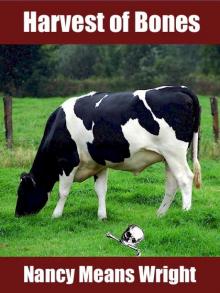 Harvest of Bones
Harvest of Bones